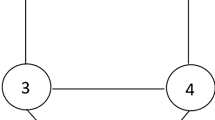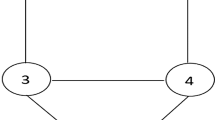Abstract
The concepts of quantum correlation complexity and quantum communication complexity were recently proposed to quantify the minimum amount of resources needed in generating bipartite classical or quantum states in the single-shot setting. The former is the minimum size of the initially shared state \({\sigma}\) on which local operations by the two parties (without communication) can generate the target state \({\rho}\), and the latter is the minimum amount of communication needed when initially sharing nothing. In this paper, we generalize these two concepts to multipartite cases, for both exact and approximate state generation. Our results are summarized as follows.
-
1.
For multipartite pure states, the correlation complexity can be completely characterized by local ranks of sybsystems.
-
2.
We extend the notion of PSD-rank of matrices to that of tensors, and use it to bound the quantum correlation complexity for generating multipartite classical distributions.
-
3.
For generating multipartite mixed quantum states, communication complexity is not always equal to correlation complexity (as opposed to bipartite case). But they differ by at most a factor of 2. Generating a multipartite mixed quantum state has the same communication complexity as generating its optimal purification. But the correlation complexities of these two tasks can be different (though still related by less than a factor of 2).
-
4.
To generate a bipartite classical distribution P(x, y) approximately, the quantum communication complexity is completely characterized by the approximate PSD-rank of P. The quantum correlation complexity of approximately generating multipartite pure states is bounded by approximate local ranks.
Similar content being viewed by others
References
Andris Ambainis, Leonard J. Schulman, Amnon Ta-Shma, Umesh Vazirani & Avi Wigderson (2003). The Quantum Communication Complexity of Sampling. SIAM Journal on Computing 32(6): 1570–1585. URL http://dx.doi.org/10.1137/S009753979935476.
Moody Chu, Robert Plemmons (2005) Nonnegative matrix factorization and applications. Bulletin of the International Linear Algebra Society 34: 2–7
Samuel Fiorini, Serge Massar, Sebastian Pokutta, Hans Raj Tiwary & Ronald de Wolf (2015). Exponential Lower Bounds for Polytopes in Combinatorial Optimization. Journal of the ACM 62 (2), 17. ISSN 0004-5411.
Prahladh Harsha, Rahul Jain, David McAllester & Jaikumar Radhakrishnan (2010). The Communication Complexity of Correlation. Information Theory, IEEE Transactions on 56(1), 438–449. ISSN 0018-9448.
Rahul Jain, Yaoyun Shi, Zhaohui Wei & Shengyu Zhang (2013). Efficient protocols for generating bipartite classical distributions and quantum states. Information Theory, IEEE Transactions on 59(8), 5171–5178. ISSN 0018-9448.
Ilan Kremer (1995). Quantum Communication. Technical report, Master’s thesis, The Hebrew University of Jerusalem, Jerusalem.
László Lovász (1989). Communication complexity: a survey. In book Paths, flows, and VLSI layout edited by B. Korte, L. Lovász, H. J. Prömel, and A. Schrijver. Springer-Verlag. URL http://books.google.ca/books?id=emw8PgAACAAJ.
Michael A. Nielsen & Isaac L. Chuang (2011). Quantum Computation and Quantum Information: 10th Anniversary Edition. Cambridge University Press, New York, NY, USA, 10th edition. ISBN 1107002176, 9781107002173.
Noam Nisan (1991). Lower Bounds for Non-commutative Computation. In Proceedings of the Twenty-third Annual ACM Symposium on Theory of Computing, STOC ’91, 410–418. ACM, New York, NY, USA. ISBN 0-89791-397-3. URL http://doi.acm.org/10.1145/103418.103462.
Mihalis Yannakakis (1988). Expressing Combinatorial Optimization Problems by Linear Programs. In Proceedings of the Twentieth Annual ACM Symposium on Theory of Computing, STOC ’88, 223–228. ACM, New York, NY, USA. ISBN 0-89791-264-0. URL http://doi.acm.org/10.1145/62212.62232.
Shengyu Zhang (2012). Quantum Strategic Game Theory. In Proceedings of the 3rd Innovations in Theoretical Computer Science Conference, ITCS ’12, 39–59. ACM, New York, NY, USA. ISBN 978-1-4503-11151. URL http://doi.acm.org/10.1145/2090236.2090241.
Author information
Authors and Affiliations
Corresponding author
Rights and permissions
About this article
Cite this article
Jain, R., Wei, Z., Yao, P. et al. Multipartite Quantum Correlation and Communication Complexities. comput. complex. 26, 199–228 (2017). https://doi.org/10.1007/s00037-016-0126-y
Received:
Published:
Issue Date:
DOI: https://doi.org/10.1007/s00037-016-0126-y




